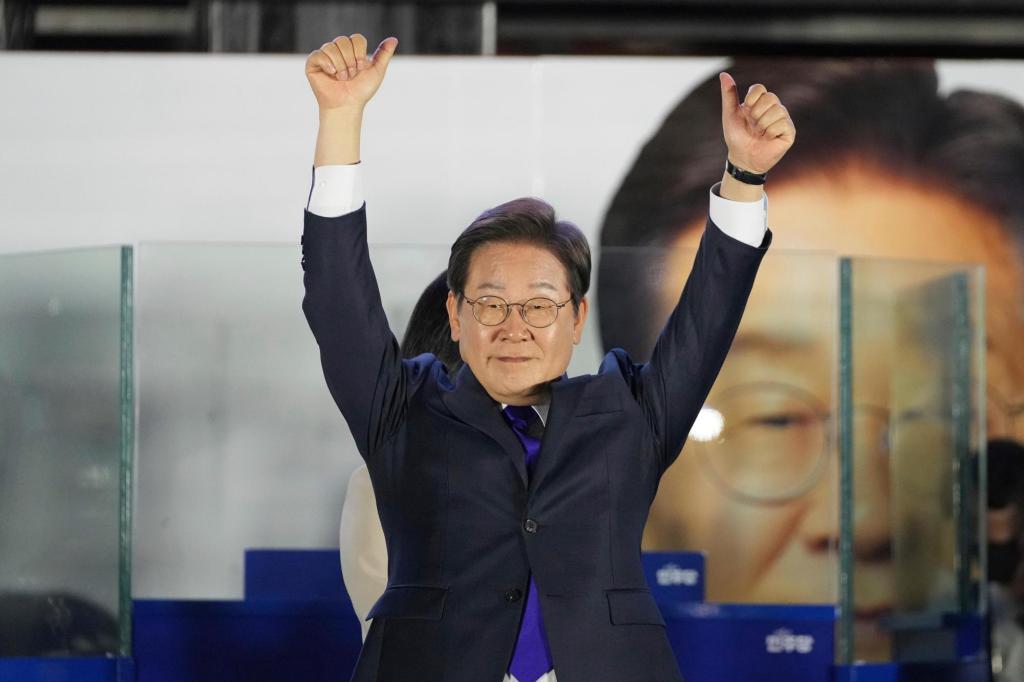Lee Jae-myung, a prominent liberal figure known for his commitment to addressing inequality and corruption, has been elected as South Korea’s president. His victory on Wednesday marks the conclusion of a tumultuous chapter in the country’s evolving democracy.
At 60 years old, Lee represents the opposition Democratic Party and is set to take office later today, following the tenure of conservative predecessor Yoon Suk Yeol, who faced severe backlash after briefly declaring martial law in December.
Lee’s ascension raises questions about potential changes in South Korea’s foreign policy. While critics have accused him of favoring closer ties with China and North Korea over alliances with the U.S. and Japan, he has consistently emphasized that America remains the cornerstone of South Korea’s foreign relations.
As he steps into office, Lee confronts significant challenges, including U.S. President Donald Trump’s trade policies and North Korea’s advancing nuclear capabilities. Analysts suggest the incoming president may have limited ability to make substantial headway on these issues regardless of who is in charge.
With more than 97% of the votes counted by 3 a.m. on Wednesday, Lee had garnered 49% of the total, leaving his closest rival, Kim Moon-soo, trailing at 41.6%, a gap exceeding 2.5 million votes—impossibly insurmountable. Polls had indicated Lee was on course for an easy victory, fueled by public dissatisfaction with the conservative administration after Yoon’s martial law crisis.
Even before the official announcement, Kim Moon-soo publicly conceded, stating he “humbly accepts the people’s choice” while congratulating Lee.
In front of thousands of enthusiastic supporters in Seoul, Lee refrained from formally declaring victory but reiterated his key policy objectives, which include revitalizing the economy, fostering peace with North Korea, and bridging domestic divides. “Let us move forward with hope and make a fresh start from this moment on,” he told the crowd, emphasizing the need for unity despite past differences.
Lee’s political journey has been marked by both inspiration and division. As a former child laborer who rose to prominence through robust critiques of the conservative establishment, he aims to implement significant reforms and tackle the country’s entrenched economic issues. However, some view him as a populist who capitalizes on political divisions and fails to uphold his commitments.
On the diplomatic front, Lee has promised a pragmatic approach, vowing to reinforce the trilateral partnership between Seoul, Washington, and Tokyo, which aligns closely with conservative perspectives. Despite his intentions to improve relations with North Korea, he has cautioned that arranging a summit with Kim Jong Un will be “very difficult,” indicating no drastic diplomatic initiatives in the immediate future.
Experts highlight the limited options for South Korea as it navigates the complexities of Trump’s tariff increases and the demands for greater financial support for U.S. military presence, alongside North Korea’s ongoing nuclear ambitions. As such, neither Lee nor Kim Moon-soo unveiled grand foreign policy ambitions during the campaign period.
Paik Wooyeal, a professor at Yonsei University in Seoul, remarked on the challenges facing Lee’s foreign policy strategists, acknowledging the low likelihood of making significant strides toward denuclearization of North Korea. He also noted that Lee does not embrace the nationalistic fervor seen in former liberal President Moon Jae-in, who engaged in multiple summits with Kim Jong Un.
Lee’s election could lead to some friction with the Trump administration, while a Kim government might prioritize concessions to Washington. Lee has argued for a patient approach towards negotiations concerning tariffs, while Kim Moon-soo expressed an eagerness to meet with Trump promptly.
In response to Trump’s recent announcement to raise tariffs on steel and aluminum products to 50%, South Korea’s trade officials held an emergency meeting. The central bank had just reduced its economic growth forecast for 2025 to 0.8%, citing potential impacts from these tariff hikes and the domestic turmoil stemming from Yoon’s impeachment.
The election signifies a pivotal moment in South Korea’s democratic evolution, but experts caution that the deep divisions within the country could pose substantial challenges for Lee’s administration. The past six months have seen significant public protests for and against Yoon, leaving a leadership void that has disrupted diplomatic endeavors and instigated instability in financial markets.
While Lee has pledged to mend the nation’s divides, his commitment to holding those accountable for Yoon’s controversial martial law has raised concerns about possible political retribution against opponents. In a Facebook post earlier Tuesday, he called for a “stern and resolute judgement” from voters towards the conservatives regarding martial law. During a recent campaign speech, he warned that a victory for Kim would signify the “return of the rebellion forces, the destruction of democracy and the deprival of people’s human rights.” Conversely, Kim contended that a Lee presidency would lead to concentrated power.

